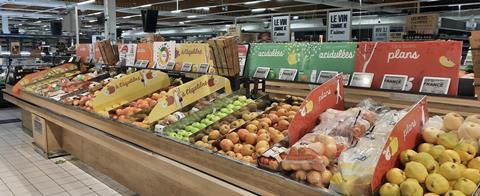The French apple exporter is focused on gaining in-depth knowledge of consumers to deploy a category-based approach that it says is proving highly successful in French supermarkets

In response to falling apple consumption in Europe, France’s Blue Whale says that revitalising the apple segment and the range of apples offered is becoming essential.
To this end, the company has sought to understand consumers around the world, getting to know their expectations in terms of the product, as well as the buying experience.
“This understanding is key to revitalising consumption,” said Christelle Bertin, Blue Whale’s director of marketing and communication. “We are the recommended apple partner. In order to develop our knowledge of consumers and understand their expectations, we’ve been carrying out large-scale studies since 2022 in France and in several other countries around the world with MarketSense.”
Three main reasons have been identified for the consumer drift away from apples: disappointing experiences in terms of taste and texture; the trivialisation of apples and a desire to turn to other fruits; and diverse consumer profiles with different expectations.
“There are around 100 varieties on the global apple market and over 70 varieties branded through clubs,” explained Bertin. “Not all these varieties will be successful. However, a wide range on the shelf can strengthen the department if a consumer approach is prioritised.”
Blue Whale has drawn on such lessons to rework how it presents its assortment to customers. “Our offer, which is relevant from a taste and organoleptic perspective, goes hand in hand with activation work both inside and outside the point of sale,” said Pauline Planté, the company’s head of marketing France. “It’s a winning combination for reaching the hearts of consumers.
“Five major consumer profiles have been updated in France, with special expectations regarding apples: from diet addicts to gourmet foodies looking for sensory pleasure, as well as no-nonsense families. Cross-referencing certain consumption data from the Kantar panel has led to some truly interesting findings. For example, our all-new Candine is a sweet, crunchy and juicy variety, which is very well suited to the expectations of young consumers who are looking for a tasty apple that’s ideal for snacking.”
The category-based approach put forward by Blue Whale has been tested for two months at various locations of retailer Leclerc. “The assortment recommended by the chain has been set up according to taste, with clear and attractive shelf markings to encourage shoppers to browse the range and discover new varieties,” Blue Whale stated.
The result? The average shopping basket has grown, with the most popular innovations outperforming the rest. “We’ve got proof it works!” declared Bertin. “A 46 per cent jump in revenue in the apple category! The different varieties bring additional benefits to the department and meet different consumer expectations.”
“We’ve developed apple management expertise and are offering a 12-month global assortment to our French medium-to-large-sized supermarket customers to get their entire departments to perform better by satisfying consumers and boosting sales,” added Planté. “We don’t just offer our varieties to push our volumes. We’re concerned about the entire department and include our competitors’ offers in our recommendations.’”
To better highlight the offer, Blue Whale has developed and deployed point-of-sale advertising in the department to guide consumers’ purchasing choices. The main consumer choice criteria have been updated, the company revealed, with taste coming first, followed by uses and expectations for apples.



